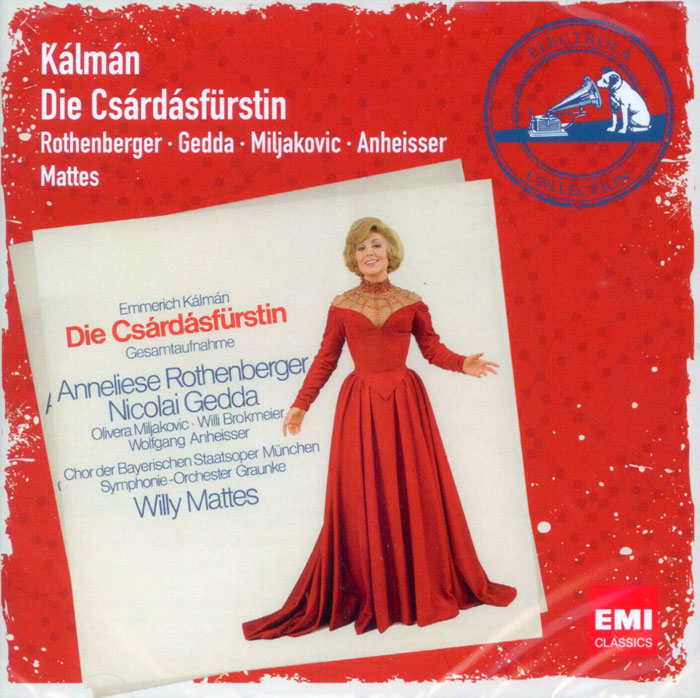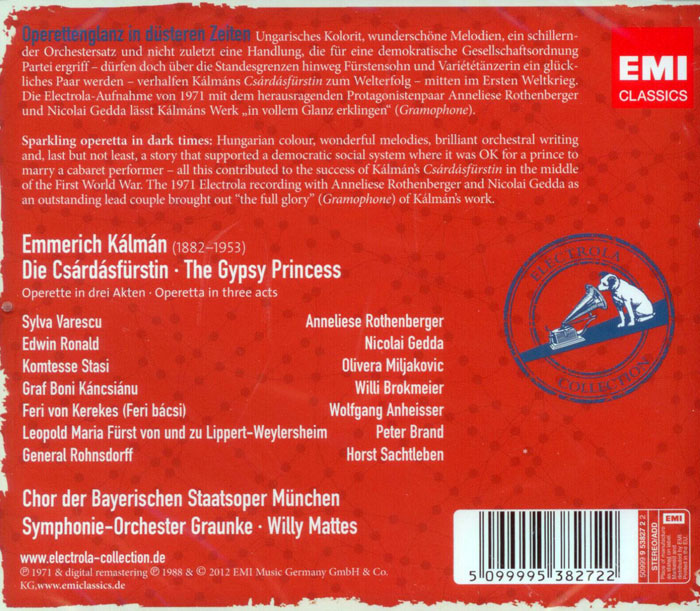Logowanie
Dlaczego wszystkjie inne nie brzmią tak jak te?
Chai Lang, Fan Tao, Broadcasting Chinese Orchestra
Illusive Butterfly
Butterly - motyl - to sekret i tajemnica muzyki chińskiej.
SpeakersCorner - OSTATNIE!!!!
RAVEL, DEBUSSY, Paul Paray, Detroit Symphony Orchestra
Prelude a l'Apres-midi d'un faune / Petite Suite / Valses nobles et sentimentales / Le Tombeau de Couperin
Samozapłon gwarantowany - Himalaje sztuki audiofilskiej
PROKOFIEV, Stanislaw Skrowaczewski, Minneapolis Symphony Orchestra
Romeo and Juliet
Stanisław Skrowaczewski,
✟ 22-02-2017
BARTOK, Antal Dorati, Philharmonia Hungarica
Dance Suite / Two Portraits / Two Excerpts From 'Mikrokosmos'
Samozapłon gwarantowany - Himalaje sztuki audiofilskiej
ENESCU, LISZT, Antal Dorati, The London Symphony Orchestra
Two Roumanian Rhapsodies / Hungarian Rhapsody Nos. 2 & 3
Samozapłon gwarantowany - Himalaje sztuki audiofilskiej
Winylowy niezbędnik
ClearAudio
Cartridge Alignment Gauge - uniwersalny przyrząd do ustawiania geometrii wkładki i ramienia
Jedyny na rynku, tak wszechstronny i właściwy do każdego typu gramofonu!
ClearAudio
Harmo-nicer - nie tylko mata gramofonowa
Najlepsze rozwiązania leżą tuż obok
IDEALNA MATA ANTYPOŚLIZGOWA I ANTYWIBRACYJNA.
Wzorcowe
Carmen Gomes
Celebrating the art and spirit of music - vol. 5 - Reference Songs
- CHCECIE TO WIERZCIE, CHCECIE - NIE WIERZCIE, ALE TO NIE JEST ZŁUDZENIE!!!
Petra Rosa, Eddie C.
Celebrating the art and spirit of music - vol. 3 - Pure
warm sophisticated voice...
SAMPLER - STS DIGITAL, Gregor Hamilton
Celebrating the art and spirit of music - vol. 2 - Love songs from Gregor Hamilton
...jak opanować serca bicie?...
SAMPLER - STS DIGITAL
Celebrating the art and spirit of music - vol. 1 - Leonardo Amuedo
Największy romans sopranu z głębokim basem... wiosennym
Lils Mackintosh
Celebrating the art and spirit of music - vol. 4 - A Tribute to Billie Holiday
Uczennica godna swej Mistrzyni
KALMAN, Anneliese Rothenberger, Nicoali Gedda
Die Csardasfurstin / The Gypsy Princess

- Anneliese Rothenberger - soprano
- Nicoali Gedda - tenor
- Willy Mattes - conductor
- Symphonie-Orchester Graunke - orchestra
- KALMAN
"Emmerich (or Imre) Kálmán (24 October 1882 – 30 October 1953) was a Hungarian-born composer of operettas. Kálmán was born Imre Koppstein in Siófok, on the southern shore of Lake Balaton, Hungary (formerly Austria-Hungary) in a Jewish family. Kálmán initially intended to become a concert pianist, but because of early-onset arthritis, he focused on composition instead. He studied music theory and composition at the National Hungarian Royal Academy of Music (then the Budapest Academy of Music), where he was a fellow student of Béla Bartók and Zoltán Kodály under Hans Kössler. His early symphonic poems were well-received, although he failed to achieve publication. However, the popularity of his humorous cabaret songs led him towards the composition of operettas. His first great success was Tatárjárás - Ein Herbstmanöver in German, meaning 'Autumn Maneuver', although the English title is The Gay Hussars, which was first staged at the Lustspieltheater in Budapest, on 22 February 1908. Thereafter he moved to Vienna where he achieved worldwide fame by composing his operettas Der Zigeunerprimas, Die Csárdásfürstin, Gräfin Mariza, and Die Zirkusprinzessin. Bust of Kálmán in Siófok Kálmán and Franz Lehár were the leading composers of what has been called the "Silver Age" of Viennese operetta during the first quarter of the 20th century. He became well known for his fusion of Viennese waltz with Hungarian csárdás. Even so, polyphonically and melodically, Kálmán was a devoted follower of Giacomo Puccini, while in his orchestration methods he employed principles characteristic of Tchaikovsky's music. Despite his Jewish origins he was one of Adolf Hitler's favorite composers. After the Anschluss, he rejected Hitler's offer to become an 'honorary Aryan' and was forced to move first to Paris, then to the United States, settling in California in 1940.Following his emigration, performances of his works were prohibited in Nazi Germany. He emigrated back to Vienna from New York in 1949 before moving in 1951 to Paris, where he died."
























